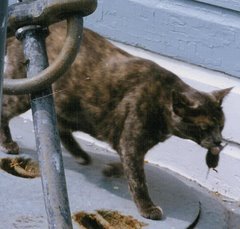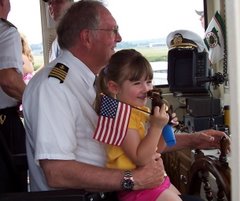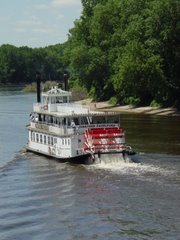Monday, August 24, 2009
Fall on the Mississippi River
If there is a better time of year to leave the world behind and vanish into wonders of nature along the timeless currents of the Father of Waters I can't imagine anything better than the fall. Fall is the time when birds gather for their annual flight south along the Mississippi Flyway and nature paints the riverbanks with a pallet of orange, red and yellow hues atop the greens of summer. There is no better way to see, feel, hear and touch nature's wonderland than aboard a Padelford Riverboat. Every cruise is different as the river flows and nature reveals her secrets.
Saturday, May 16, 2009
Memorial Day Tribute
On Memorial Day 2009 Padelford Riverboats is hosting 2,600 passengers as a salute to the military in celebration of our 40th Anniversary celebration. Thinking of Memorial Day turns my thoughts to a recent visit our family took to Normandy, France with my father-in-law, Capt. William D. Bowell, Sr., who parachuted behind enemy lines on D-Day. The following article tells about that remarkable opportunity we had in 2005 to retrace his World War II adventure.
Wednesday, May 6, 2009
Capt. Bowell & Family Revisit D-Day Experience

As the brutal winds of an early Minnesota winter shrouded the empty, predawn roadway to the Minneapolis airport warm feelings of our impending flight to Europe already had begun to invade our senses. Little did we know just how strong the imprint of this voyage was to be on our lives.
PHOTO CAPTION: Capt. Bowell embraces his daughters Beth Myers and Shelley Kosmo as they visit the battle ground at Omaha Beach.
It was October 2005 when Shelley and I had the grand opportunity to accompany her father as he retraced his footsteps from the June 6, 1944 D-Day Invasion of Normandy, France. Her sister Beth Myers, cousins John and Steve Bowell and their spouses Bobby Myers and Laurie and Cindy Bowell as well as family friends Dorothy Calabrese and Paul and Caroline Verret accompanied us. Paul, former president of the Saint Paul Foundation, grew close to our family upon realization of the fact that his uncle, Capt. John “Chappie” Verret, had been chaplain in Bill’s army regiment. Fr. Verret died in battle while assisting an injured soldier only 100 feet from Bowell.
Shelley’s dad, Capt. William D. Bowell Sr., Inc., jumped into Normandy in northern France near Sainte-Mere-Eglise with the 82nd Airborne on June 6, 1944, D-Day. An army private at the time, Bill rose to the rank of sergeant during the war. He became a captain much later in life as a civilian by earning a passenger vessel license from the U.S. Coast Guard to serve as a Mississippi Riverboat pilot. He founded the Padelford Packet Boat Co., Inc. in 1970.
During the D-Day Invasion Bill jumped from a Douglas C-47 troop transport after many months training in England. He landed behind enemy lines when the plane was shot down and took refuge in a barn where he was fed and assisted by a French family even as Nazi soldiers passed through the yard. Like most of those in his unit Bowell found himself in the midst of numerous battles, some virtually nose-to-nose with German soldiers. Unlike many of his buddies, Bowell survived all of his close encounters, although injured twice, and lived to tell his story. Once he walked around the corner of a French farmhouse and literally ran into a German soldier. Bowell fired first and the German soldier ran off.
We traveled to that French farmhouse, met the son of the family that protected Bill from the Germans and visited the battlefields and cemeteries where the blood of thousands of Americans altered the course of history. Standing in the loft of the very barn where he hid under a pile of hay as German soldiers walked below was a breathtaking experience. Talking with this amicable, easy-going farm family that could just as easily have come from Scandia, MN as La Fiere, France, it was difficult to imagine the horror that had reined upon their country in 1944.
The farm actually is quite large and has several sizeable stone structures including the house and barn. It was especially amazing to realize that the farmhouse was constructed in the 15th century, about the time Columbus came to America. Our host, Gerald Lemiere is the son of the couple that risked their lives to assist Bowell.
After his 1944 jump into France Bowell joined up with a handful of paratroopers. Despite a language barrier a farmer was able to point out their location on a map, about 25 miles from their target, but 61 years later Bowell realizes that error actually may have saved his life because the intended landing zone had been flooded by the Nazis and surround by hostile forces. Many of those who landed in the designated drop zone drowned, died in battle or were captured.
“The first day we found a hidden spot and stayed there until nightfall,” he explains. “We headed north through orchards and a maze of hedgerows. Near dawn we ran into the Douve River with no way to cross. The only bridge was heavily guarded by the Germans.”
Bowell slipped through a field to a prosperous-looking farm with gray stone buildings. There he encountered Gerald Lemiere’s mother tending to her garden in the midst of the battle zone. Upon identifying himself as an American soldier Bowell was greeted with a shriek of joy as she pulled him into the farmhouse and explained that they were part of the French underground. They offered him food, a place to sleep and instructions on how to join up with his unit. Bowell brought his men to the farmhouse where they spent the night hiding in the barn. The next day they were taken to another farm where arrangements were made for a boat to take them across the river.
“Much to our surprise, about 40 more paratroopers led by a lieutenant colonel were waiting at the boat. The boat carried five men and each trip across took 30 minutes. By daylight more than half the men had reached the other side, so it was necessary to wait for cover of night.”
Bowell and his buddies made it across the river but not without encountering enemy troops and engaging in a pitched two-hour battle. When one soldier shouted that the Germans were flanking their position Bowell, a marksman, climbed a small knoll and spotted a squad of enemy soldiers advancing toward their position. “Oddly, a movie about Sgt. York in World War I came to mind,” Bowell recalls. “When caught in a position similar to Bowell’s Sgt York had recalled his hunting days in west Virginia when he learned that to shoot turkeys it was best to start at the back of the line and work forward to keep the front turkeys from seeing what was happening. So, just like Sgt. York, that’s what I did. I shot the last six enemy soldiers in the line. Then bullets started raining on my position. Next I saw bombs falling nearby and each one was coming closer. It was time to leave.”
Just as the small band of American paratroopers was about to be overrun by the enemy a U.S. Army battalion arrived and drove off the Germans. Bowell was among 12 of the original 45 paratroopers to survive. Injured he trudged back to the rear for medical assistance.
“German dead were strewn along either side of the road. Some of the men picked souvenirs off the bodies. The remains of American paratroopers were there, too. The dead who lay around us had little effect on us. It was necessary to steel ourselves against any softening. At times it was a very difficult thing to do.”
After a brief stint recovering at the rear Bowell returned to battle where he suffered a shrapnel wound and was evacuated to England to mend again and then went back into action in the Battle of the Bulge.
Amfreville, one of the tiny French towns the 82nd Airborne liberated in 1944, has a large monument to the 507th PIR but the small community has little money to improve and maintain the memorial. On our 2005 visit Bill presented two new U.S. flags to Amfreville Mayor Alain Maitre to replace the worn flag he had seen on an earlier visit.
Next we traveled to Graignes, another small city in Normandy with a similar war history. We were scheduled to have lunch with Mayor M. David Small , but as an elementary school teacher he had only a limited time for lunch. He invited us to visit his classroom before lunch to meet with his students and answer their questions. Our entourage arrived at the neat little school where 16 hungry minds drilled Capt. Bowell with questions. Inasmuch as virtually every one of the students had relatives with direct war experience they had extensive knowledge and excellent questions. The old soldier held court with the youngsters and it was truly difficult to determine who enjoyed the exchange the most.
From Graignes we went to lunch with two sisters who were featured in a recent television movie and are recipients of awards from both the French and American governments for their acts of extreme heroism during the war. Odette and Martha were only 12 and 16 years of age in 1944 but their actions were heroic beyond their years. U.S. paratroopers descended into the swamps surrounding Colleville during the night July 6. With the area teeming with enemy soldiers the Americans escaped to the high ground and took refuge in a small church that became a hospital, sanctuary and lookout. Unfortunately, much of their ammunition and weapons was left behind in the fields and swamps nearby.
Learning of the problem Odette and Martha repeatedly walked past enemy soldiers with two wheelbarrows, gathered the weapons and ammunition and brought them to the Americans. Amazingly, none of the German soldiers ever looked under the hay in the wheelbarrows as the two young women made trip after trip from the fields to the church. Once the GIs had enough weapons and ammunition Odette and Martha led them to the nearby river where they helped them across a few at a time in a small rowboat. Across the river they were able to join up with the main U.S. force and ultimately return to their unit. The two heroines survived, but the Germans murdered many of the town’s residents before the Americans could retake the city.
After visits to the killing fields at Omaha Beach and Utah Beach, where the broken guns, shattered concrete bunkers and pock-marked terrain stand today as living testimony to the bloody battles of 1944, we visited the American Cemetery, Colleville-sur-Mer, overlooking the sea. The military cemetery that is owned and maintained by the U.S. has 9,387 American military graves each marked with a stark white cross. Among the more notable graves are those of the two brothers of Private Ryan (not their real name) who was subject of a major motion picture staring Tom Hanks. The two brothers were killed in separate battles one day apart. Also interred at Colleville-sur-Mer is Brigadier General Theodore Roosevelt Jr., a Medal of Honor soldier who refused a command order not to accompany his men into battle.
At the cemetery Capt. Bowell was given the honor of receiving the U.S. flag as it was lowered. After folding and presenting the colors to end the day he turned abruptly toward the 9,387 white crosses, stood at a perfect attention and saluted his fallen comrades. Even the crusty old soldier/riverboat captain couldn’t hold back a tear.
Another touching event occurred at dinner one night in Bayeux, France where Capt. Bowell was regaling our group with war stories. A couple at the next table understood very limited English but detected enough to inquire about our group. Upon learning that Capt. Bowell had participated in the D-Day Invasion they came to our table, bought us champagne and embraced Capt. Bowell with a vigorous hug, normally an uncomfortable event for a staid Norwegian-American. The man from Belgium explained that his father had been imprisoned in a Nazi concentration camp where he was rescued by the U.S. airborne. He thanked Capt. Bowell and the Americans profusely for saving the lives of his family and all of Belgium. The old soldier shed another tear.
The Belgian’s appreciation was very demonstrative, but not uncommon as we traveled through Normandy. In fact, although we had embarked upon our European voyage with some trepidation, we were greeted by nothing but smiles and grand acts of kindness throughout France, Italy and Spain on the streets, in restaurants and everywhere we went. The fear of anti-American sentiment was non-existent. Undoubtedly there are people throughout the world who dislike Americans, but we never saw them. The only unpleasant people we met were two Paris cab drivers, but that had nothing to do with our being Americans -- they just don’t like anyone.
Our 2005 Normandy invasion was made even more special by our guide, Jean-Baptiste Feuillye, aka “Bobbye”. Bobbye, who was featured in a USA-Today story recently was age 13 on June 5, 1944. He was lying in bed in his family’s 12th-Century stone farmhouse listening to the nightly cacophony of bombs and antiaircraft explosions when he detected the hum overhead of aircraft headed for the German lines. Shortly after midnight he heard a strange thump on the roof and then another and another. Racing outside he encountered a dozen American soldiers in his own yard.
“I was Americanized that day when the American angels dropped from the sky,” Bobbye recalls with great pride. “What surprised me the most was that you could not hear them. They walked quietly and talked in sign language or whispers, unlike the boisterous Germans, who you could hear half a mile away. The Americans were very silent. They did not act like warriors. They were more like hunters.”
The American soldiers adopted Bobbye as their unofficial “mascot” and, with his parents’ permission, took him along to help them learn the local terrain. They taught him English, made him a small American uniform and gave him the name Bobbye that he proudly uses to this day. After the war he kept in close contact with his soldier “buddies”, became a leading authority on all World War II information and traveled frequently to America. Bobbye’s constant stream of intriguing stories alone was well worth the trip to France.
Although our Normandy Invasion was far more enjoyable than Bill’s original voyage it too has generated memories that will last a lifetime.
Saturday, April 11, 2009
40th Anniversary Events
Padelford Riverboats is putting together a series of special events to thank our passengers and friends for 40 years of loyalty. There'll be prizes, free riverboat rides and something very special for wedding couples. Watch for details soon.
Subscribe to:
Comments (Atom)





